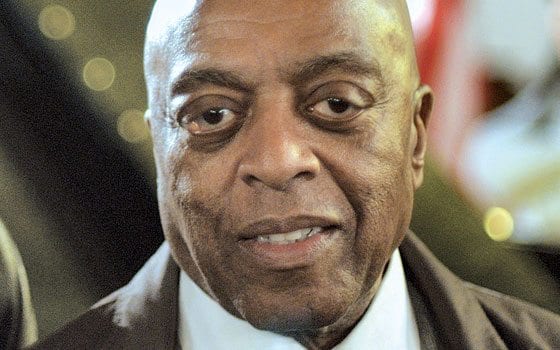
No question about it: Roy Haynes, the drummer once proclaimed by Billboard magazine as “one of the seven wonders of modern jazz,” is a Roxbury man.
He was born there in 1925.
“I grew up … around Ruggles Street,” Haynes recalls. “I went to the William Bacon School on Vernon Street, then to the Dudley School, then to a new school called the James P. Timilty — that was the school I loved the most. They had drum corps and bands and all of that.
“From there, I went to Roxbury Memorial [High School],” he continues. “I didn’t finish at Roxbury Memorial — at that point, I was already working in Scollay Square and Bowdoin Square with different bands.”
Haynes’ reputation among his peers quickly grew and spread to New York, where bandleader Louis Russell sent for him.
“I was playing a gig at Oak Bluffs one summer in 1945, and I received a letter from Russell asking if I was interested in coming to New York,” Haynes says.
He was.
Haynes soon arrived in New York, living in Harlem and playing at the world famous Savoy Ballroom.
“Oh, man,” he laughs. “I was in heaven!”
And the rest is jazz history.
This week, Haynes will make history again when he is honored as the 2009 Jazz Master in Residence at Harvard University.
His residency, which will run April 15-18, is scheduled to include rehearsals with students, a visit to Boston Latin School, and an interview with radio host Steve Schwartz on his WGBH 89.7 FM show, “Jazz From Studio Four.”
Haynes has played with a who’s who of jazz legends: Lester Young, Charlie Parker, Miles Davis, Thelonious Monk, Sarah Vaughan and John Coltrane, just to name a few.
“In each instance,” notes Harvard Bands Director Tom Everett, “Haynes was able to integrate his own unique voice into the ensemble while fostering the musical intent and design of the leader. His tightly tuned drums create a crispness and clarity that is his signature sound.”
Still going strong, Haynes has already won two Grammy awards, and has earned nominations for each of his last three albums. Well into his 80s, he still appears at or near the top of jazz critics’ polls.
Haynes recently returned from Paris, where he received France’s highest artistic honor, Commander of the Ordre des Arts et Lettres (Order of Arts and Letters).
Returning to the Boston area to be honored is especially thrilling for Haynes.
“Sometimes me and my brother Mike” — the Rev. Dr. Michael E. Haynes, pastor emeritus of Twelfth Baptist Church in Roxbury — “used to walk on Sundays from Roxbury to Cambridge to visit our relatives,” Haynes recalls. “But I never imagined — never even dreamed of — ever being honored over there.”
Always thrilled to play in this area, Haynes is nonetheless disappointed by what he sees as a decline in interest in jazz, particularly in the African American community.
“Some of the people still remember me from Roxbury, or their children do, so there’s still a connection when I come to play in Boston, but ordinarily you don’t see too many black people in the audiences throughout the world,” he said. “… No attention is paid to it in the black community. At one time we had it in our neighborhoods, so the youngsters could hear it, but now they know nothing about it.
“They don’t hear it on the radio, so it seems like black people know less about jazz than anybody.”
Haynes remembers a time when the music and the musicians were tightly woven into the fabric of the black community.
“I opened Birdland with Charlie Parker in 1949, and people would stand out in the rain and in the snow. And black people were not known for standing out in the rain and snow,” he laughs. “We would go places in the South, Jim Crow areas where we couldn’t stay at the white hotels. We would go to the black section of town and people would always take us in. In those days, we were all closer. That’s missing today.”
Still, Haynes sees a bright future for jazz in the many younger musicians he has mentored and inspired, such as his concert’s special guest, Roy Hargrove. They have played together many times, and share much more than first names and last initials.
“Lots of times, if I’m playing some place like the Village Vanguard in New York, [Hargrove will] pop in and come right up and start playing with us,” Haynes says. “We’ve got a thing going without words …”
Haynes’ April 15-18 Harvard residency provides a unique opportunity for students and fans of music to listen to, learn from and experience one of the very few living legends of jazz — a man who is more than happy to teach and share his experiences and his music.
“Music is a great thing, it’s like a religion,” Haynes says. “It can take you out of your problems and get your mind off of whatever it’s on. Listen to some real live music — so-called jazz or otherwise. Listen to music. Listen to music, regardless of what type of music it is. Listen to music!”






